Your kidneys are the ultimate multitaskers. These two bean-shaped organs silently toil away behind the scenes, performing a variety of vital functions that keep your body running smoothly. They act as a natural filtration system, removing waste products and excess fluids from your blood. They also play a crucial role in balancing electrolytes, essential minerals that regulate nerve and muscle function, and in producing hormones that help control blood pressure and red blood cell production.
Given their critical role in overall health, keeping your kidneys healthy is essential. While there’s no magic bullet for guaranteed kidney health, incorporating certain dietary choices can provide valuable support.
This blog post dives deep into 7 fantastic foods that can be incorporated into your diet to promote kidney health, along with explanations of their benefits and easy tips for including them in your meals. We’ll also explore some general dietary practices that can benefit your kidneys and provide tips on when to consult a healthcare professional.
The Power of Food: Why Diet Matters for Kidney Health
The old adage “you are what you eat” rings especially true when it comes to kidney health. The foods you choose have a direct impact on your kidneys’ workload. A diet high in processed foods, saturated fats, added sugars, and sodium can put a strain on your kidneys and increase your risk of chronic kidney disease (CKD).
On the other hand, a diet rich in fruits, vegetables, whole grains, and lean protein can provide essential nutrients that support kidney function and overall health. These beneficial foods are often packed with antioxidants, which help combat harmful free radicals that can damage cells, including those in your kidneys.
7 Fantastic Foods for Healthy Kidneys
Now, let’s get down to the delicious details! Here are 7 fantastic foods to add to your plate for optimal kidney health:
1. Berrylicious Boost:
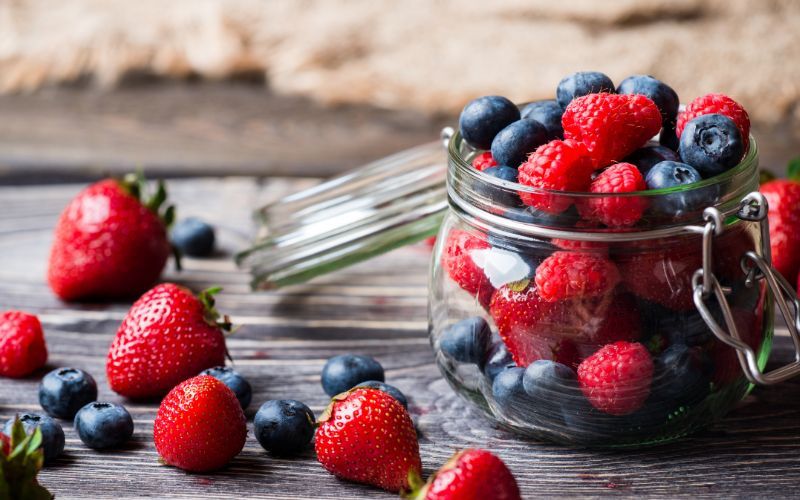
Berries like blueberries, strawberries, and raspberries are little nutritional powerhouses. They’re bursting with antioxidants called anthocyanins, which give them their vibrant colors and offer anti-inflammatory properties. Chronic inflammation is a risk factor for various health problems, including kidney disease. Studies suggest that anthocyanins may help reduce inflammation and protect your kidneys from damage [1].
Tips for Including Berries:
- Blend them into a refreshing smoothie with yogurt and spinach for a protein and antioxidant punch.
- Top your morning oatmeal with a handful of fresh or frozen berries for a burst of sweetness and flavor.
- Enjoy a bowl of mixed berries as a healthy and satisfying dessert.
2. Olive Oil: The Heart-Healthy Hero:
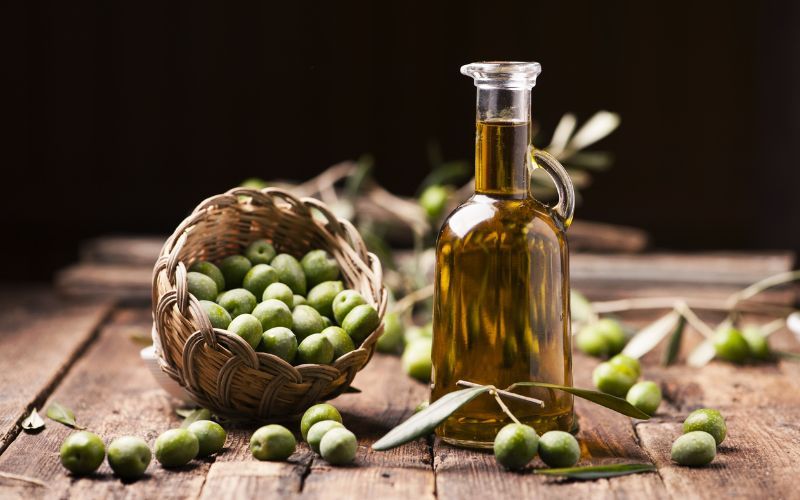
Extra virgin olive oil is a staple in the Mediterranean diet, and for good reason! This liquid gold is brimming with monounsaturated fats, which are considered “healthy fats.” Studies have shown that these fats can help lower blood pressure and improve blood cholesterol levels, both of which are beneficial for kidney health [2]. Olive oil also boasts anti-inflammatory properties, which can further support kidney function.
Tips for Including Olive Oil:
- Drizzle olive oil over salads, roasted vegetables, or grilled fish for a flavorful addition.
- Use olive oil for light sauteing instead of butter or other cooking oils.
- Experiment with infusing olive oil with herbs like garlic, rosemary, or thyme for a delicious finishing touch on various dishes.
3. Cruciferous Crew:
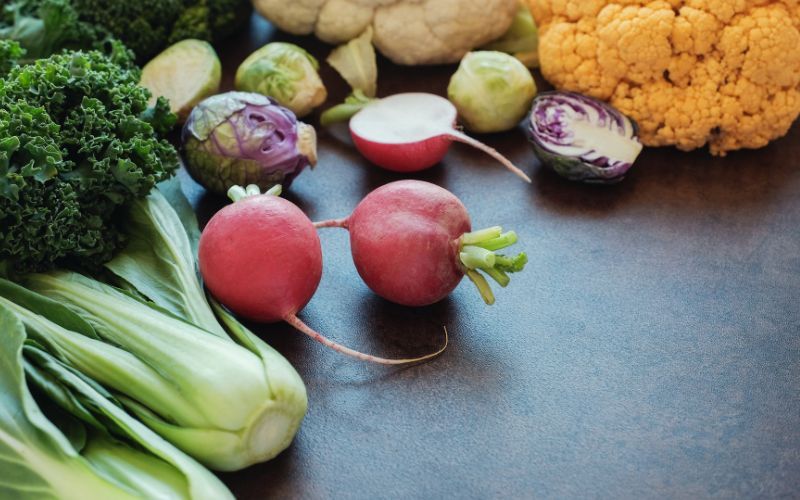
Broccoli, cauliflower, and cabbage are all members of the cruciferous vegetable family. These versatile veggies are packed with essential vitamins, minerals, and fiber. Research suggests that cruciferous vegetables may offer some protection against kidney disease due to their sulforaphane content. Sulforaphane is a plant compound that has been shown to possess anti-inflammatory and antioxidant properties .
Tips for Including Cruciferous Vegetables:
- Roast a colorful medley of broccoli, cauliflower, and red peppers for a simple and satisfying side dish.
- Steam or stir-fry broccoli florets for a quick and healthy addition to your meals.
- Add chopped cabbage to soups, stews, or stir-fries for extra texture and flavor.
4. Fishy Friends:

Fatty fish like salmon, mackerel, and sardines are swimming with benefits for your kidneys. These types of fish are rich in omega-3 fatty acids, a type of polyunsaturated fat lauded for its heart-healthy properties. Omega-3s have also been shown to reduce inflammation and improve blood vessel health, both of which can benefit your kidneys .
Tips for Including Fatty Fish:
- Bake or grill salmon fillets with a sprinkle of lemon pepper for a flavorful and healthy main course.
- Enjoy canned sardines on whole-wheat crackers for a protein-packed snack.
- Whip up a batch of salmon burgers for a fun and nutritious twist on a classic.
5. Bell Pepper Power:

These vibrant vegetables are loaded with vitamin C, a powerful antioxidant that helps protect your cells from damage. Vitamin C may also play a role in reducing inflammation and boosting the immune system, both of which contribute to overall health and potentially support kidney function.
Tips for Including Bell Peppers:
- Slice bell peppers into strips for a colorful and refreshing addition to salads or crudité platters.
- Stuff bell peppers with quinoa, ground turkey, and a mixture of your favorite vegetables for a delicious and healthy meal.
- Roast bell peppers until softened and slightly charred for a smoky flavor that enhances various dishes.
6. Garlic Goodness:
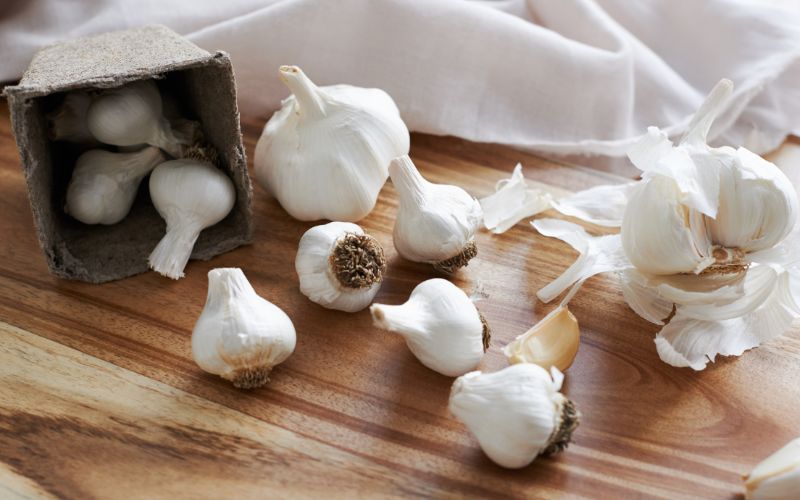
This versatile herb adds a flavorful punch to your dishes and may also offer some kidney-protective benefits. Garlic contains allicin, a compound with anti-inflammatory properties that may help reduce blood pressure, a risk factor for kidney disease.
Tips for Including Garlic:
- Mince garlic and saute it in olive oil before adding other ingredients to stir-fries, soups, or stews.
- Roast a whole head of garlic for a mellow and spreadable addition to crackers or bread.
- Infuse olive oil with garlic cloves for a flavorful base for salad dressings or marinades.
7. Apple a Day:
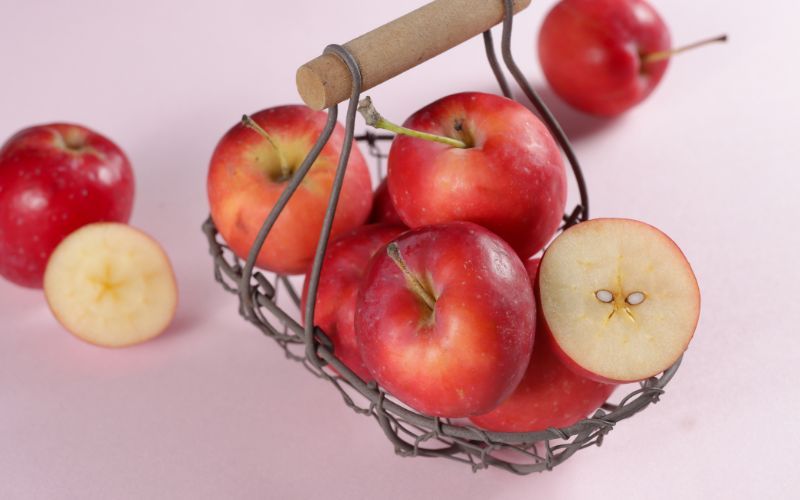
An oldie but a goodie! Apples are a fantastic source of fiber, a crucial nutrient for overall health. Fiber helps promote gut health and digestion, which can indirectly benefit your kidneys by reducing the workload of filtering waste products. Apples are also a good source of vitamin C, adding another layer of antioxidant support.
Tips for Including Apples:
- Slice apples and enjoy them with a sprinkle of cinnamon for a healthy and satisfying snack.
- Dice apples and add them to salads for a sweet and crunchy element.
- Bake apples with a touch of cinnamon and honey for a warm and comforting dessert.
Remember: While these foods are fantastic choices for promoting kidney health, it’s important to note that moderation is key. For example, berries are high in fiber, but too much fiber can be counterproductive. It’s always best to consult with a doctor or registered dietitian for personalized dietary advice, especially if you have any pre-existing kidney conditions.
Bonus Tip: Hydration is Key!
Water is essential for overall health, and your kidneys are no exception. Aim to drink plenty of fluids throughout the day to help flush out waste products and keep your kidneys functioning optimally. The exact amount of water you need can vary depending on factors like your activity level and climate, but a good general guideline is to aim for eight glasses of water per day.
Dietary Practices for Healthy Kidneys
While incorporating these fantastic foods into your diet is a great step towards kidney health, there are additional dietary practices worth considering:
- Limit Sodium Intake: Sodium, the main component of table salt, is essential for various bodily functions, but too much can put a strain on your kidneys. Aim to limit your daily sodium intake to around 2,300 milligrams (mg), ideally aiming for less than 1,500 mg if you have pre-existing kidney issues [9].
- Choose Lean Protein Sources: Protein is an essential nutrient, but consuming excessive amounts of protein, particularly from animal sources, can increase the workload on your kidneys. Opt for lean protein sources like fish, poultry, beans, and lentils.
- Moderate Potassium Intake: Potassium is another important mineral, but for people with certain kidney conditions, high potassium levels can be problematic. Consult your doctor or a registered dietitian for personalized guidance on potassium intake if you have any concerns.
- Reduce Processed Foods: Processed foods are often high in sodium, unhealthy fats, and added sugars, all of which can negatively impact your kidneys. Opt for whole, unprocessed foods whenever possible.
When to Consult a Healthcare Professional
While these dietary tips can be beneficial for everyone, it’s crucial to consult with a healthcare professional if you have any concerns about your kidney health. Here are some situations when a doctor’s visit is recommended:
- You notice a change in your urinary habits, such as blood in your urine, frequent urination, or difficulty urinating.
- You experience unexplained swelling in your ankles, feet, or hands.
- You have persistent fatigue or weakness.
- You have a family history of kidney disease.
- You have a pre-existing condition like diabetes or high blood pressure that can increase your risk of kidney problems.
By working with your doctor or a registered dietitian, you can develop a personalized plan to support your kidney health through diet and lifestyle modifications.
Important Note: The information in this blog post is intended for general informational purposes only and does not constitute medical advice. It is important to consult with a qualified healthcare professional for personalized guidance on diet and lifestyle practices for optimal kidney health. This is especially important if you have any pre-existing health conditions, including kidney disease.
Share the Knowledge!
Did you find this information helpful? We’d love to hear from you! Share this post with anyone who might benefit from learning more about kidney health. Also, feel free to leave a comment below with any questions you may have. We’re here to empower you to make informed choices about your health!














Add a comment